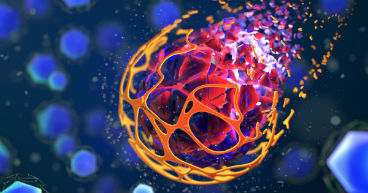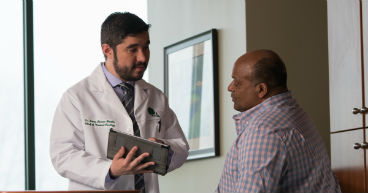
Tasting and enjoying food is an important part of life. But cancer and its treatment may affect your sense of taste, which may impact your nutritional well-being and quality of life. Taste changes may lead to loss of appetite, food aversions, vitamin deficiency, weight loss, and malnutrition. Being able to maintain good nutrition during cancer treatment may help support immune function, rebuild body tissue, decrease your risk of infection, improve your strength and energy, and help you better tolerate treatment.
When you have cancer, changes in taste and smell may be related to a variety of causes. For example, taste changes may result from the cancer itself, since tumors may secrete substances that change your taste and reduce your drive to eat. Taste changes are also a common side effect of some cancer treatments. For instance, chemotherapy, which is designed to destroy rapidly dividing cancer cells, may also damage normal cells that divide rapidly, such as those in the mouth. The spread of chemotherapy drugs in tissues of the mouth and/or damage to taste receptors may also cause taste changes. In addition, nausea and vomiting caused by chemotherapy may lead to a loss of taste.
Some taste changes are temporary, while others may take months or even years to return to normal. How long taste changes last is different for each individual and depends on many factors, such as your cancer treatment regime.
Steps to help manage taste changes
Fortunately, there are steps you may be able to take to meet your nutritional needs and reduce the impact of taste changes on your quality of life.
Keep your doctor informed. Your body needs nutrition, especially when undergoing rigorous cancer treatment. If you find that changes in taste and smell are limiting your food intake or causing significant weight loss, be sure to let your doctor know. Your care team may recommend ways to increase your calorie intake, such as through vitamin and mineral supplementation and protein shakes.
Practice good oral hygiene. Cancer treatments like chemotherapy may disrupt the bacteria balance in the mouth and irritate the taste buds. Keeping your mouth clean and healthy helps food taste better. Gently brush your teeth, gums and tongue with a soft bristled toothbrush in the morning, before and after meals, and before bedtime. Choose a mild-tasting, non-abrasive toothpaste with fluoride.
Rinse your mouth frequently. Rinsing may help prevent infections, improve the healing of mouth sores, and neutralize bad tastes in the mouth. Try rinsing with a mild solution of water, baking soda and salt before meals. If this works temporarily, repeat the rinse halfway through a meal.
Visit your dentist. Dental problems, oral infections, and dry mouth may affect the taste of food. Your dentist can check the health of your mouth and help you understand the oral side effects of cancer treatment. Your dentist may also provide rinses to fight infection in the mouth and medication to increase saliva production.
Chew sugar-free gum or mints. If you have a bad taste in your mouth, try sugar-free mints, gum, hard candies, lemon drops, etc. This may also help control a bitter or metallic taste in the mouth and help relieve mouth dryness by stimulating saliva. Tea, ginger ale, and sports drinks may also rid the mouth of bad tastes.
Eat small, frequent meals. Instead of three large meals a day, try to eat small, frequent meals six to eight times per day. To add calories and nutrients in between meals, eat healthy snacks throughout the day.
Stay hydrated. Drink eight glasses of liquids daily to keep your body well hydrated.
Quit tobacco. Avoid cigarettes, dips and tobacco products, which may make taste changes worse.
Experiment with different foods. Eating may become more enjoyable when you are open to trying new foods. Choose and prepare foods that smell and taste good to you, even if the food is unfamiliar. Also, since your taste buds may change from day to day, keep a variety of foods on hand.
Use plastic and glass. If foods taste metallic, use plastic utensils and glass cookware and drink beverages from bottles, not cans.
Eat foods at the right temperature. Cold or chilled foods may taste better than warm or hot foods. Also, cold or room-temperature foods also have less of an aroma. If you do eat warm foods, try to eliminate bad cooking odors that may trigger nausea by using an exhaust fan, cooking on an outdoor grill, or buying precooked foods.
Add seasoning/spices to food. To improve the taste of the food, flavor foods with seasonings, herbs, spices and flavorings, such as sugar, lemon, mint, dill, basil, oregano, chili powder, rosemary, garlic, ginger, salt and cinnamon. Try marinating meat, poultry or fish in fruit juices, sweet wines, salad dressing, vinegars, sauces, and gravies.
Make mealtime an enjoyable experience. Eat in a comfortable, relaxed environment and avoid the sight and smell of foods that cause unpleasantness. To keep mealtime interesting, vary the time, place, and surroundings. You may find that you eat more when you are socializing, so invite friends or family members to join you. To distract yourself, you could also listen to your favorite music or television show while you eat.
Consult with a dietitian. A dietitian can help you make changes in food choice and preparations to minimize the impact of taste changes and help you meet your calorie and protein needs. Your dietitian may recommend appetite stimulants or vitamins and supplements, such as zinc sulfate. If you can’t eat solid foods, your dietitian may recommend liquid or powdered meal replacements and shakes.
Learn why probiotics are important for a healthy digestive system.



